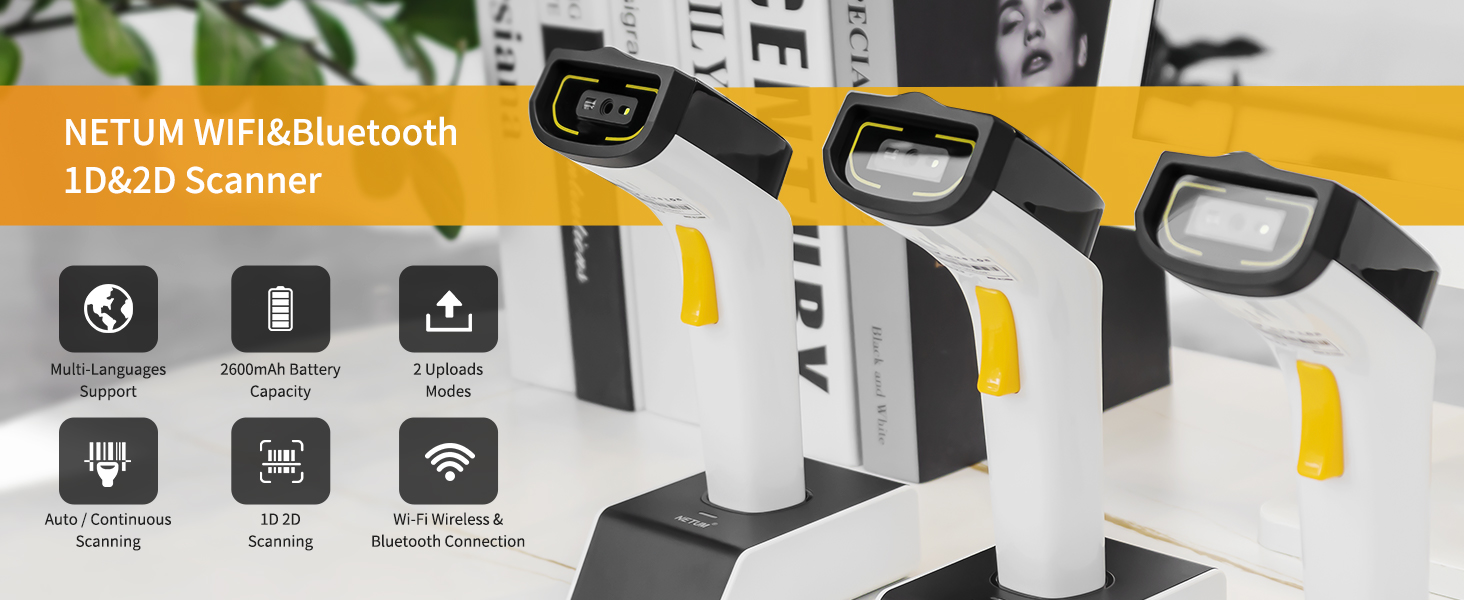In the fast-paced and high-stakes medical field, choosing the right barcode scanner is crucial for streamlining workflows, ensuring patient safety, and maintaining regulatory compliance. From medication tracking and patient identification to laboratory sample management, a reliable barcode scanner can minimize human errors and enhance operational efficiency. With a wide range of options available on the market—including wifi barcode scanner, QR code scanner, Wi-Fi 2D Barcode Scanner, and wifi bluetooth barcode scanner—clarifying core selection criteria is essential to find a device that meets the unique needs of medical applications.

The primary consideration is compliance with medical industry standards. Medical barcode scanners must support specialized code formats such as GS1 DataMatrix, UDI (Unique Device Identification) barcodes, and QR codes on patient wristbands. They need to seamlessly compatible with both 1D and 2D barcodes, including QR codes commonly used for patient medical records and medication labels in healthcare settings. As a key performance requirement, accurate reading of even small, damaged, or curved barcodes is imperative—this is critical in scenarios like blood sample tracking and medication administration, where precise identification directly relates to patient safety. Additionally, the scanner’s data output format must comply with medical system integration requirements, enabling smooth synchronization with Electronic Medical Record (EMR) and Hospital Information System (HIS) to ensure compliant and efficient data flow.
In medical environments, equipment requires frequent cleaning with strong disinfectants to prevent cross-contamination, so durability and disinfection resistance are another key consideration. High-quality medical-grade barcode scanners should feature a high protection rating design, capable of withstanding repeated exposure to disinfectants such as alcohol and bleach without compromising performance. They should also possess a certain level of drop resistance, supporting falls from a height of 1.5 meters or more, making them suitable for high-traffic areas like emergency rooms and pharmacies where accidental drops are common. For scenarios requiring flexible mobile operations, the dual-connection design of wifi bluetooth barcode scanner offers distinct advantages, combining durability with portability to allow healthcare staff to move freely between wards while maintaining stable data transmission.
For medical workflows that require real-time information sharing, connectivity and reliable data transmission are vital. A high-quality wifi barcode scanner should provide stable wireless connectivity to ensure scanned data—whether patient IDs, medication details, or laboratory results—is instantly synced to central systems. Devices equipped with 2.4G/5G dual-band Wi-Fi are preferred, as they can deliver high-speed, interference-free connections even in large hospitals with multiple concurrent device connections. When Wi-Fi is unavailable, the built-in Bluetooth 5.0 module enables direct pairing with smartphones or tablets, serving as a flexible wifi bluetooth barcode scanner that adapts to different environmental conditions and ensures workflow continuity in scenarios such as pharmacy cart scanning and bedside patient verification.
In medical settings where healthcare staff use scanners for extended periods, user-friendliness and ergonomic design are equally important. An ideal scanner should feature a lightweight, ergonomic grip to reduce hand fatigue during prolonged use. The operation design should be intuitive and convenient, equipped with a bright LED aimer and adjustable vibration feedback (in conjunction with audio prompts), allowing healthcare staff to operate silently in noise-sensitive areas like wards and intensive care units. Meanwhile, scanning speed should meet high-efficiency standards to ensure rapid processing of large volumes of patients, medications, or samples. As a Wi-Fi 2D Barcode Scanner, eliminating the constraints of wired connections to provide staff with more flexible working space is also key to improving efficiency.
For medical facilities operating 24/7, battery life is another core factor. High-quality medical wifi barcode scanners should be equipped with large-capacity rechargeable batteries, supporting up to 12 hours or more of continuous use on a single charge—sufficient to cover an entire work shift without frequent recharging. Fast-charging functionality and replaceable battery designs further enhance convenience, ensuring the device can quickly recharge during breaks and avoiding workflow disruptions due to charging, thus meeting the round-the-clock operational needs of medical institutions.
When evaluating medical QR code scanners or wifi barcode scanners, cost-effectiveness and after-sales service should not be overlooked. Professional-grade devices need to balance reliable performance with reasonable pricing, aligning with the budget requirements of the medical industry. Additionally, the brand should provide timely technical support and firmware updates to ensure the scanner remains compatible with evolving medical software and industry standards. Choosing a brand with a strong market reputation and technical expertise can reduce equipment usage risks and provide long-term stable support for medical institutions. As a well-known brand in the barcode scanning technology sector, Netum’s DS-2800 wifi barcode scanner is an excellent choice that meets all the aforementioned requirements—it not only supports full compatibility with 1D/2D barcodes, IP54-rated disinfection resistance, and dual-band Wi-Fi + Bluetooth 5.0 dual connectivity but also features a lightweight ergonomic design and 12-hour long battery life, perfectly adapting to the diverse needs of medical scenarios.
In conclusion, selecting a barcode scanner for medical applications requires comprehensive consideration of core factors such as compliance, durability, connectivity, user-friendliness, and battery life. With its professional product configuration and in-depth optimization for medical scenarios, the Netum DS-2800 wifi barcode scanner emerges as a preferred solution that combines versatility, high reliability, and cost-effectiveness. Whether you need a QR code scanner for patient identification, a Wi-Fi 2D Barcode Scanner for laboratory sample tracking, or a wifi bluetooth barcode scanner for flexible connectivity, the Netum DS-2800 consistently delivers stable performance, helping medical institutions enhance patient safety, streamline workflows, and achieve higher operational efficiency.

